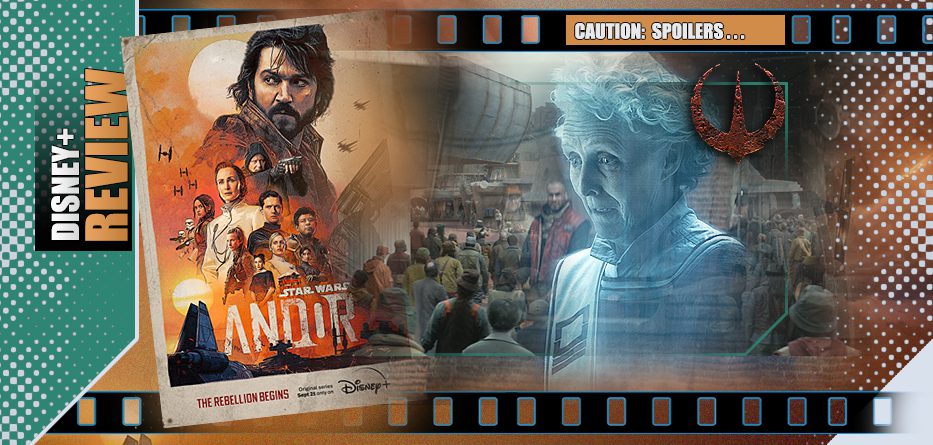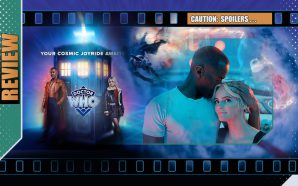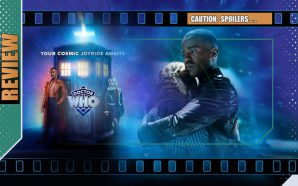Cassian Andor has returned to Ferrix in time for his adoptive mother’s funeral. But even as the local townspeople come to honour one of their most respected citizens, there are plenty of people milling around in the crowd who intend to see Andor dead or removed from play.
As tensions rise, it’s inevitable that a clash is about to happen, but who will survive this historical day… and even if they do, how will their lives be changed?
*spoilers*
“There is a darkness reaching like rust. It’s here and it’s not visiting anymore. It wants to stay…”
One can cite HBO‘s Game of Thrones (and it’s House of the Dragon sequel) and Amazon‘s The Rings of Power (the Tolkien-embraced prequel) as the prestige television of the year but both sailed in on a sea of known-element marketing and expectations, arguably meeting them in most regards (your subjective fantastical credentials may vary). However, it’s been Disney+‘s Andor, more than anything, that became something more by defying the expectations entirely and still coming up with a handful of aces and bonafides that made it something else and something quite special. There’s no Force majestic here, no Jedi, no Baby Yoda-sized cuteness to fall back on…. just intrigue, duplicity, subterfuge and the mundane made menacing. Rather thana series built on props, it’s built on foundations.
The ultimate result is that while there have been some familiar touchstones in iconography such as uniforms, sigils and language, almost everything else of importance has been excavated from the dirty ground up, a universe of Saturday matinee questing suddenly told through the prism of a post-watershed spy thriller. It’s Flash Gordon via La Carre, James Cameron dissected by Ken Loach and George Lucas by the way of…. well, Tony Gilroy. It’s just the sort of disturbance in the Force we didn’t know we needed.
Some viewers arrived expecting reverential action-figure merchandising ventures such as The Mandalorian, The Book of Bobba Fett and, to some extent Obi-Wan Kenobi (each of which have their own earned place in a universe originally designed for them) but jumped ship after the first three episodes (released together and now being shown on ABC to entice Disney+ subscriptions) proved to be something well-crafted but very, very different from expectations and slower to reveal its riches. But eventually they gleamed like diamonds in the proverbial rough. Here, perhaps unexpectedly, people suffer, bleed, betray and even the good guys are questionable, but even without the popcorn, the drama holds you like a tractor beam.
Diego Luna has simmered nicely through the run, conveying the weight and shifting priorities that the backwater petty thief has experienced in his tenuous orbit around the outer-rim of Imperial occupation. The whole Andor saga (which will run to two seasons and then dovetail into the pre-existing Rogue One) is a unique opportunity to follow that evolution of a character in a way that would never be as successful in a feature film format. But the observation that – so far – he’s an evolving reactionary who isn’t really that pro-active, remains – Luna’s acting is fine, but for the entire season the character has been pinballed from crisis to crisis and hasn’t been given enough to do, other than save his own skin. Even here in the finale, he’s mostly darting in and out of the shadows while the other townsfolk man the frontline. But you can see why the likes of veteran actors Stellan Skarsgård (as Luthen Rael), Fiona Shaw (as Maarva Andor) and Andy Serkis (as Kino Loy) signed up as supporting cast, each given free rein to play to their non-genre strengths and delivering some astonishing scenes of innate power-play. Ironically, that might be one of the few quibbles – that the series has used Diego Luna’s Cassian Andor as the titular through-line of it all, but it’s been those supporting players who have bolstered it and done the load-bearing as the MVPs throughout.
The over-arching twelve-episode series was essentially told in mini-arcs of around three episodes each and though every chapter had its own selling-point, there’s still some justification for saying the collective season could have run to less episodes with slightly tighter story-telling or even re-ordering of events, but it’s a minor gripe as we reach the finale, Rix Road, and things really start to connect and interweave. Almost everyone seems to be converging on Ferrix, most of them after Cassian Andor and ready to end him on sight and yet unaware of the other interested parties. The likes of Luthen, Denise Gough’s Dedra Meero, Varada Sethu’s Cinta Kaz, Faye Marsay’s Vel Sartha and Kyle Soller’s Syril Karn are all there in the crowd with their own agendas and from their various viewpoints, watching things unfold… all reluctant participants to different extents.
Though it appears that Shaw’s Maarva has indeed shuffled off this mortal coil to join the rebellion invisible, it was rather obvious that we’d see more of her in some way shape or form before the season was done – anything else would be a waste. Lo and behold, we have her posthumous possession topped off with a previously recorded holographic testimony (via mourning droid B2-EMO in which she speaks to her regrets and then gives a stirring speech about the nature of resistance. Too late the hovering Imperial forces decide to end what is rapidly becoming a rally, but by then – of course – it’s far too late and all they do is further light the touchpaper of the Rix Road riot.
Writer Tony Gilroy and director Benjamin Caron keep things kinetic and claustrophobic and unlike the feature films, you can almost feel the close-up impacts, with a ton of casualties and storm-troopers unusually proficient. If the early visual shots of the wake feel like something out of a ceremonial New Orleans funeral march or Yorkshire brass band, then the resulting shooting of guns and rifles and their chaos feels like a genuine riot, with people often moving instinctively and blindly as smoke and debris shroud proceedings and both sides of the equation panic under extreme conditions. There’s real cost here, echoing historical real-world moments, and when that smoke actually does clear, you know the debris and carnage will be felt for some time to come. It’s the story equivalent of an unforgiving roadside IED rather than a narrative IOU.
By the end of the episode we don’t know how successful the townsfolk have been (though we cheer them on, will they be ground underfoot in retribution off-screen ad between seasons?) However, Syril has saved Deera and they perhaps realise they have a common cause (however wretched that may be); a severely traumatized Bix Caleen (Adria Arjona) has been broken out of the hotel/prison and Luthen comes to realise that Cassian might actually be a worthy convert to the cause, thus sparing his life (which was, of course, inevitable, but which works well).
Though most of the story is told on Ferrix, there’s still time to nudge the Mon Mothma story forward as she deftly manages to shift attention. Suspecting that her driver (Press Gang‘s Lee Ross) is a mole (he is!), she plants the seed that the suspicious hole in their finances is more to do with a recurrence of her husband’s gambling debts than anything she’s been doing to help the rebellion off the books. It’s a clever ruse that helps her, but she still has to deal with the more uncomfortable sacrifices she’s made at home regarding her daughter’s potential betrothal and connections to the shadier parts of the money-laundering black market.
This may not be Marvel, but it is Disney+ and we do get a post-credit scene adding a bit of context to an earlier part of the run. It seems that rumours were right and in a quite nihilistic touch, the items that Andor and his fellow prisoners were making on Nardina 5… were indeed components for the Death Star which we see is inching closer to completion.
So… no, this may not be the technicolor world of the Saturday Matinee anymore, but – pacing faults and all – it is the very thing great science-fiction should always strive to be: entertainment with an edge, a mission with a message and a celestial mirror to modern day maladies. As an exploration of rebellion and resistance rather than derring-do and spotless space knights…it’s one that makes that galaxy far, far away, seem uncomfortably, dramatically close and relevant. And that’s its triumph.
- Story10
- Acting9
- Direction10
- Production Design / VFX9











